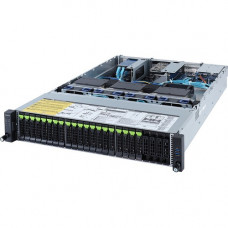Shopping Cart
0 item(s) - $0.00- Accortec, Inc.
- Addon Tech
- Advantech Co., Ltd
- Axiom
- BLACKBOX
- C2g
- Chief Manufacturing
- Cisco
- Dell
- EATON
- EMC
- Enet Components, Inc.
- Fortinet
- Getac, Inc
- HP
- HPE
- IBM
- Intel
- Legrand Group
- Lenovo
- Lexmark
- Middle Atlantic Products, Inc
- Monoprice, Inc
- National Products, Inc
- Panduit Corp
- StarTech.com
- Supermicro
- TDK
- Tripp Lite
- Veritas Technologies Llc
Gigabyte R282-Z9G Barebone System - 2U Rack-mountable - Socket SP3 - 2 x Processor Support - AMD Chip - 128 GB DDR4 SDRAM DDR4-3200/PC4-25600 Maximum RAM Support - 32 Total Memory Slots - Serial ATA/600 RAID Supported, 12Gb/s SAS Controller - ASPEED AST25
Part Number: R282-Z9G
MSRP: $7,553.99
Availability: 10 or more
Condition: New
Add to Compare
AMD EPYC™ 7003 Series Processors - "Milan" GIGABYTE servers and AMD EPYC 7003 Series Processors deliver the highest possible I/O throughput to pave the way for fast communication between CPU and accelerator in HPC and data analytics. Up to 64 Cores 8 Channels of DDR4-3200 Up to 4TB Memory Capacity 128 lanes PCIe 4.0 2-way SMT & Turbo Boost 4,6,8-channel Memory Interleave Synchronized Fabric and Memory Clock Speeds Secure Memory Encryption Secure Encrypted Virtualization GIGABYTE Server and GRAID SupremeRAID™ | Solutions that deliver 100% NVMe SSD performance without sacrificing data security While traditional RAID technology has become the bottleneck of SSD disks, GRAID Technology has developed a disruptive software + hardware solution to unlock the performance bottleneck of RAID protection for SSDs. GRAID SupremeRAID works by installing a virtual NVMe controller onto the operating system and integrating a PCIe device into the system equipped with a high-performance AI processor to handle all RAID operations of the virtual NVMe controller. This setup offers many advantages: Takes full advantage of NVMe performance - 6 million random IOPS and 100 GiB/s throughput which is currently the industry leading performance benchmark Unlike traditional Software RAID it does not consume a large amount of CPU resources Overcomes the limitations of Hardware RAID cards, such as computing performance, PCIe bandwidth, number of SSD support and the effort of battery maintenance etc Plug and play, and can be used even for systems without PCIe switches that used SSDs directly connected to the CPU via PCIe without needing to change the hardware design SCI (Software Composable Infrastructure) compatible and can be used for external SSDs connected via NVMeOF Highly scalable, and new software functions such as compression and encryption can easily be added Max Memory Speed Even at 2 DPC With GIGABYTE unique solution, maximum memory speed is now supported, even when using 2 DIMMS per channel. GIGABYTE''s server platforms give you the performance edge, with more memory capacity at faster speeds. Hardware Security | Hardware-level Root of Trust (RoT) Protection is built in the silicon to ensure systems will not be vulnerable to security attacks or cyber threats. This ROT helps isolate the system as the boot process starts to verify cryptographic operations and ensures the firmware is not compromised by malware.
Write a review
Your Name:Your Review: Note: HTML is not translated!
Rating: Bad Good
Enter the code in the box below:


